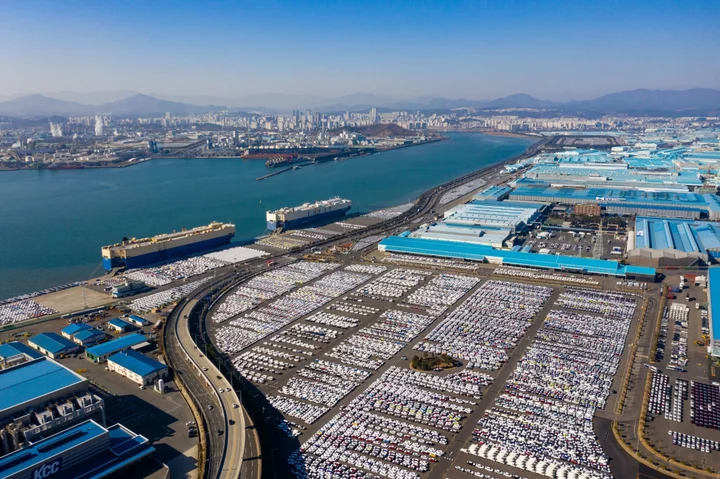Hyundai Motor Co. will start construction of a new electric vehicle plant in South Korea capable of producing 200,000 cars a year.
The carmaker held a groundbreaking ceremony Monday in Ulsan, where the company built its first auto plant in 1968. Work will begin later this year and mass production will start in the first quarter of 2026, with the luxury Genesis large-size sport utility vehicle the first model to roll off the assembly line.
Hyundai will invest 2 trillion won ($1.5 billion) building the plant, which will cover 548,000 square meters of land at a former motor racing circuit. The site is located inside Hyundai’s Ulsan factory complex, which already has annual production capacity of 1.4 million cars.
The groundbreaking ceremony was attended by politicians, the city mayor, Hyundai workers in blue jumpsuits, and a retired factory head who worked at the complex in the 1970s. Building a new EV plant in South Korea was one of biggest requests from Hyundai’s union and city officials.
“Ulsan is surviving because of Hyundai,” Mayor Doo-gyum Kim said at the ceremony. “We love you, Hyundai!”
Hyundai’s Executive Chair Chung Euisun also stressed the importance of the city, saying: “Ulsan is where South Korea’s automobile industry started when the country was suffering from the aftermath of the war. This EV-dedicated plant’s smart mobility technology will make the workplace a more efficient and safer place.”
Hyundai is also building an EV plant in the US state of Georgia, to meet the requirements of President Joe Biden’s Inflation Reduction Act, which offers tax credits to US-made EVs. Affiliate Kia Corp. is building an EV plant in the South Korean city of Hwaseong.
Hyundai Motor Group, which controls the Hyundai, Kia and Genesis brands, plans to boost annual output of EVs in Korea to 1.51 million cars by the end of this decade, or about 40% of the group’s estimated global EV production of 3.64 million vehicles.
Read More: Hyundai Commits to $18 Billion Spend in Shift to Electric Cars
Hyundai Chief Executive Officer Jay Chang said the automaker still believes the global industry is moving toward an electrified future, despite recent concerns over slowing demand that has seen the likes of General Motors Co., Ford Motor Co. and Toyota Motor Corp. wind back their outlook for EV sales.
“We are always studying infrastructure, the inconvenience of charging EVs,” Chang said. “But I’d say EVs are still leading the trend.”

